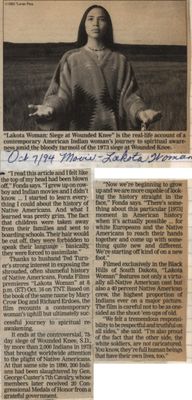"Movie - Lakota Woman"
- Full Text
- "Lakota Woman: Siege at Wounded Knee" is the real-life account of a contemporary American Indian woman's journey to spiritual awareness amid the bloody turmoil of the 1973 siege at Wounded Knee. "I read this article and I felt like the top of my head had been blown off," Fonda says. "I grew up on cowboy and Indian movies and I didn't know. ... I started to learn everything I could about the history of Native Americans. And what I learned was pretty grim. The fact that children were taken away from their families and sent to boarding schools. Their hair would be cut off, they were forbidden to speak their language - basically, they were forced to assimilate." Thanks to husband Ted Turner's strong interest in exposing the shrouded, often shameful history of Native Americans, Fonda Films premieres "Lakota Woman" at 8 p.m. (ET) Oct. 16 on TNT. Based on the book of the same name by Mary Crow Dog and Richard Erdoes, the film recounts a contemporary woman's uphill but ultimately successful journey to spiritual re-awakening. It ends at the controversial, 73-day siege of Wounded Knee, S.D., by more than 2,000 Indians in 1973 that brought worldwide attention to the plight of Native Americans. At that same site in 1890, 200 Indians had been slaughtered by Gen. George Custer's 7th Cavalry, whose members later received 20 Congressional Medals of Honor from a grateful government.
"Now we're beginning to grow up and we are more capable of looking the history straight in the face," Fonda says. "There's something about this particular [1973] moment in American history when it's actually possible ... for white Europeans and the Native Americans to reach their hands together and come up with something quite new and different. We're starting off kind of on a new foot."
Filmed exclusively in the Black Hills of South Dakota, "Lakota Woman" features not only a virtually all-Native American cast but also a 40 percent Native American crew, the highest proportion of Indians ever on a major picture. The film is careful not to be as one-sided as the shot-'em-ups of old.
"We felt a tremendous responsibility to be respectful and truthful on all sides," she said. "I'm also proud of the fact that the other side, the white soldiers, are not caricatured. You know, they're full humans being that have their own lives, too."
- Mystery Question
- Who is the author of this article?[Please answer by clicking on the Comments tab]
- Media Type
- Newspaper
- Item Types
- Articles
- Clippings
- Description
- "I read this article and I felt like the top of my head had been blown off," Fonda says. "I grew up on cowboys and Indian movies and I didn't know. ... I started to learn everything I could about the history of Native Americans. And what I learned was pretty grim. The fact that children were taken away from their families and sent to boarding schools. Their hair would be cut off, they were forbidden to speak their language - basically, they were forced to assimilate."
- Subject(s)
- Personal Name(s)
- Turner, Ted ; Crow Dog, Mary ; Erdoes, Richard ; Custer, Gen. George ; Fonda.
- Corporate Name(s)
- Fonda Films
- Local identifier
- SNPL00317v00d
- Collection
- Scrapbook 6
- Language of Item
- English
- Creative Commons licence
 [more details]
[more details]- Copyright Statement
- Copyright status unknown. Responsibility for determining the copyright status and any use rests exclusively with the user.
- Contact
- Six Nations Public LibraryEmail:info@snpl.ca
Website:
Agency street/mail address:1679 Chiefswood Rd
PO Box 149
Ohsweken, ON N0A 1M0
519-445-2954



